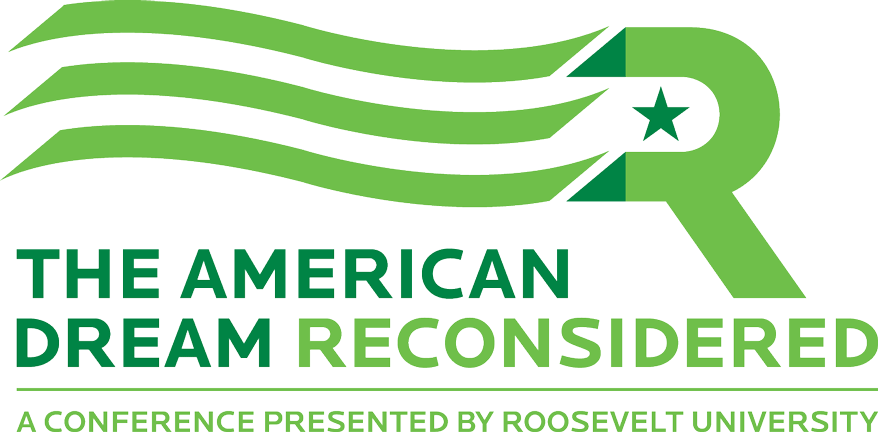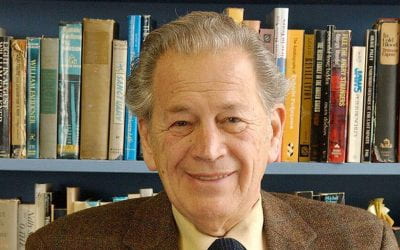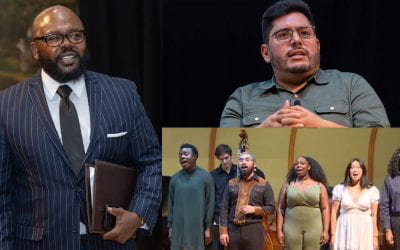The Historical Oddity of American Health Care
AMERICAN DREAM RECONSIDERED 2018by Susheela Bhat-Harkins

The inaugural panel of the 2018 American Dream Reconsidered Conference, “The Historical Oddity of American Health Care,” featured guest speakers Drs. Lawrence Brown from the Columbia University Mailman School of Public Health, Guian McKee from the Miller Center, and Stephanie Vomvouras from Blue Cross Blue Shield of Illinois. The panel, led by Roosevelt College of Pharmacy Dean Melissa Hogan, delved into the post-World War II history of American health care and how historical, institutional, ideological and political factors shaped it into a system unlike any in the industrialized world.
Kicking off the discussion, Brown summarized the story of American health care from past to present, touching on some of the major historical and political shifts that led to the most significant changes over the decades. McKee fleshed out the background on various policies developed during each presidential administration and how all of those decisions built up to the U.S. health care system we know today.

(from left) Dr. Lawrence D. Brown, professor in the Department of Health Policy and Management at Columbia University’s Mailman School of Public Health; Guian McKee, associate professor in presidential studies at the University of Virginia’s Miller Center of Public Affairs; Dr. Stephanie Vomvouras, vice president of healthcare delivery and chief medical officer for Blue Cross Blue Shield of Illinois.
“The irony [of Dr. Vomvouras’s suggestion] wasn’t lost on me, that laymen patients are somehow supposed to understand and take on a task that an entire hall of experts could not unravel.”
-Karina Herrera
Roosevelt University McNair Scholar
In part because of its origins, the American health care system is confusing to navigate for average patients, particularly when it comes to understanding what insurance can and cannot do. Vomvouras suggested health literacy and price transparency in insurance systems would lead to improved insurance expenses. In other words, if patients had better awareness of varying costs in insurance, they would cherry-pick prices, forcing the market to adjust these prices according.
During the Q&A following the panel, attendee Karina Herrera was struck by some of the statements made during the discussion. Hererra, a McNair Scholar at Roosevelt who recently transferred to the University’s public health program, said, “The irony [of Dr. Vomvouras’s suggestion] wasn’t lost on me, that laymen patients are somehow supposed to understand and take on a task that an entire hall of experts could not unravel.”
Considering there are no social programs that currently exist to teach people about U.S. health care, Hererra went on to ask the panelists how it could be considered fair to place the burden of increasing health literacy on populations who may already be facing significant social barriers. Brown and McKee agreed that there are complex socioeconomic factors at play, and that patients do not always have the luxury of becoming health care literate when they are potentially dealing with poverty, illness, and homelessness — any of which would prevent them from having the ability to deal with the cost of health care.
Concluding the panel, all three panelists agreed that no single solution can solve the issues in American health care, and there are no clear first steps to take. Since health care policies don’t exist in a vacuum, McKee and Vomvouras suggested health care education and reform will have to be prioritized as part of a larger package of social changes. Until then, as Brown said in closing statements, “The more I study U.S. health care, the less I understand it.”
More in this section
Standing up for what is right
The Untermyer Award honors Long’s many proclivities: nominees are professors who are prolific in their subject area, are innovative in the classroom and combine their teaching with activism.
Our Ted Talk: Remembering President Emeritus Theodore Gross
Ted Gross was a great leader. A man with transforming ideas, which he enthusiastically shared. He had great expectations for us. Above all, his legacy was defined by hope.
The City and The American Dream
Cities have served as key sites of economic innovation and growth, cultural self-expression, and central American ideas, such as the melting pot. This makes the city an ideal lens through which to think about the American dream, especially at Roosevelt University in the heart of Chicago.



